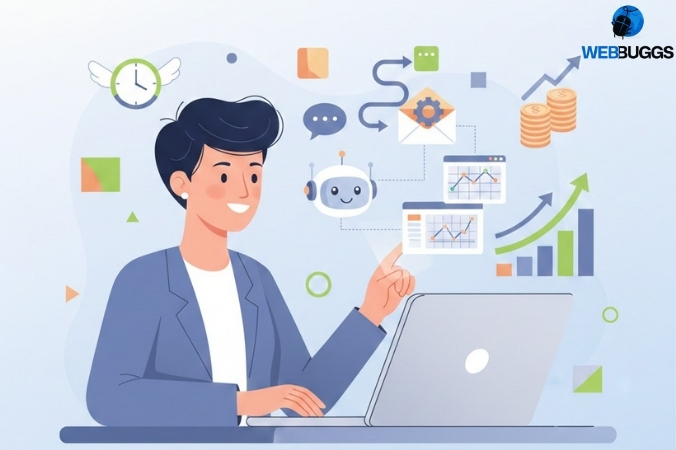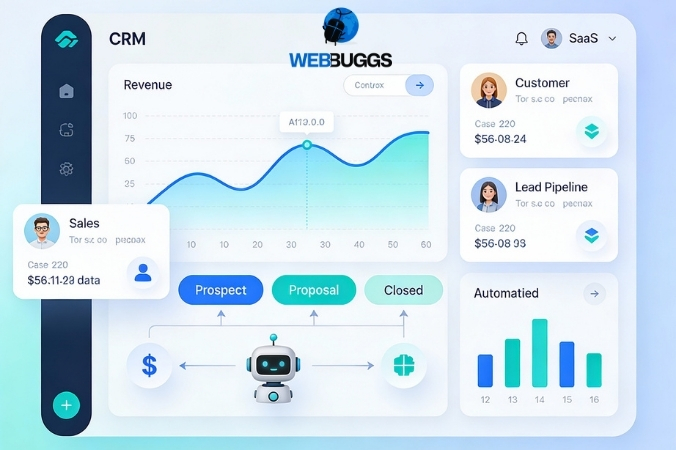Mobile App Development in USA: Driving Innovation and Growth

One essential tool for helping companies grow, streamline processes, and successfully engage with their target market is mobile app development in USA from Webbuggs. The possibilities of developing mobile apps are more apparent than ever in the USA, a city with a flourishing IT sector.
With its state-of-the-art infrastructure, skilled developer community, and advantageous location, Toronto provides a distinct edge for companies developing high-performing, user-friendly apps. This blog examines the main facets of mobile app development in Toronto, focusing on its technical, functional, and business growth possibilities.
Advantages of Collaborating with a Top USA Mobile App Development Company
Localized Market Information
When you work with Webbuggs, a mobile app development company, you're working with developers who are well-versed in the local market. This knowledge is essential for creating apps that appeal to specific users and guaranteeing that functionality and design meet user expectations.
Collaborative Space
Working in person with local developers improves communication, reduces miscommunication, and speeds up project completion times. This direct engagement produces a higher-quality final product through quicker decision-making and efficient troubleshooting.
.
Emphasis on Scalability
Scalability is a top priority for USA-based app developers, enabling companies to expand and change without undergoing significant redesigns. Organizations can effectively adapt to growing user demand thanks to this insight.
Continuous Maintenance & Support
Local businesses provide ongoing assistance after the app launches to ensure it stays updated, secure, and functional. This is essential for companies that depend on their applications to communicate with customers because poor performance may result in a significant loss of income.
Future Prospects for Revolutionary Trends in Mobile App Development in 2024
The quick development of mobile apps keeps expanding what is conceivable. Significant technological changes will change how mobile applications are created, used, and perceived in 2024. This post thoroughly analyzes the most important developments, including their ramifications for developers and companies.
Artificial Intelligence & Machine Learning: Powering Smart Apps
AI and machine learning have become central to mobile app development, transforming how apps work. These technologies are helping apps become smarter, offering more personalized, predictive, and user-friendly experiences. AI makes apps more interactive and intuitive by analyzing large amounts of data and learning from user behavior.
Features like natural language processing (NLP) are improving voice assistants and chatbots, making communication with users more accurate and natural. This improves interactions and helps businesses improve customer service, streamline tasks, and make their apps more accessible. AI is also revolutionizing image and speech recognition, allowing apps to offer real-time language translation, which is valuable across different industries.
Integrating AI into businesses' apps provides a competitive edge. By improving personalization, AI increases user engagement and loyalty, ultimately boosting customer satisfaction.
5G Technology: Redefining Speed and Connectivity
The introduction of 5G technology is changing how mobile apps perform. With faster data speeds and lower delays, 5G enhances the capabilities of many apps, especially those that require a lot of data, like telemedicine, gaming, and real-time analytics.
One of 5 G's most significant benefits is that it allows complex tasks to be handled in the cloud, making it possible for resource-heavy applications like augmented reality (AR) and virtual reality (VR) to run smoothly on mobile devices without putting too much strain on them. 5G also improves the Internet of Things (IoT), creating better device connections and developing innovative apps.
For businesses, 5G opens up new possibilities for real-time data analysis and IoT integration, particularly in sectors like healthcare, logistics, and manufacturing, where it can enhance operations and decision-making.
Cross-Platform Development: Streamlining App Creation
Cross-platform development frameworks such as React Native, Flutter, and Xamarin have become popular tools for app developers. These frameworks allow developers to build apps on multiple platforms—like iOS, Android, and the web—from a single codebase. This saves time, reduces development costs, and ensures a consistent user experience across different devices.
React Native is known for its flexibility, Flutter for its fast rendering, and Xamarin for offering a native-like experience while reusing most of the code. Each framework has strengths, and the choice depends on the project's specific needs.
As these cross-platform tools continue to improve, they will make app development more efficient, cut costs, and simplify business maintenance.
Mobile App Security & Privacy: A Growing Concern
Mobile app security has never been more critical, with cyber threats becoming more advanced. Businesses must prioritize secure app development to protect user data. With increasing concerns about data breaches and privacy issues, a growing demand for apps offering secure communication and robust authentication methods is growing.
Please address security risks to avoid losing customer trust and facing legal penalties. Developers must focus on security-first design, using features like biometric authentication and ensuring compliance with data protection laws to safeguard user information.
Sustainable App Development: Going Green
Sustainability has become a priority in the tech world, and mobile app development is following suit. Developers adopt practices that reduce environmental impact as data centers and devices consume more energy. This includes optimizing apps to use less energy and minimizing resource consumption.
Consumers are also starting to favor eco-friendly products, so apps demonstrating a commitment to sustainability are more likely to build loyal user bases.
Mobile Commerce (m-commerce): Transforming Retail
Mobile commerce (m-commerce) is changing how people shop, with more consumers purchasing through their smartphones. Mobile apps that offer secure and fast payment systems are making shopping more accessible and more convenient. Features like one-click ordering, digital wallets, and in-app purchases are now essential for successful mCommerce apps.
Innovative technologies like augmented reality (AR) and voice search enhance the mCommerce experience. AR lets customers see how products look in real life before they buy, while voice search allows for hands-free shopping, making the process even more seamless.
Webbuggs: USA's Top Mobile App Development Company
Webbuggs specializes in delivering high-performance mobile applications suited to the cutthroat business environments of the USA. Our development method uses React Native and Flutter for cross-platform efficiency, guaranteeing apps that run smoothly on iOS and Android.
Our advanced UI/UX design proficiency, blockchain security, and AI integration ensure scalable, safe, and intuitive solutions. The local development team at Webbuggs offers real-time collaboration and in-depth market insights to produce apps that satisfy the highest functional and design requirements while appealing to tech-savvy audience.
.svg)




